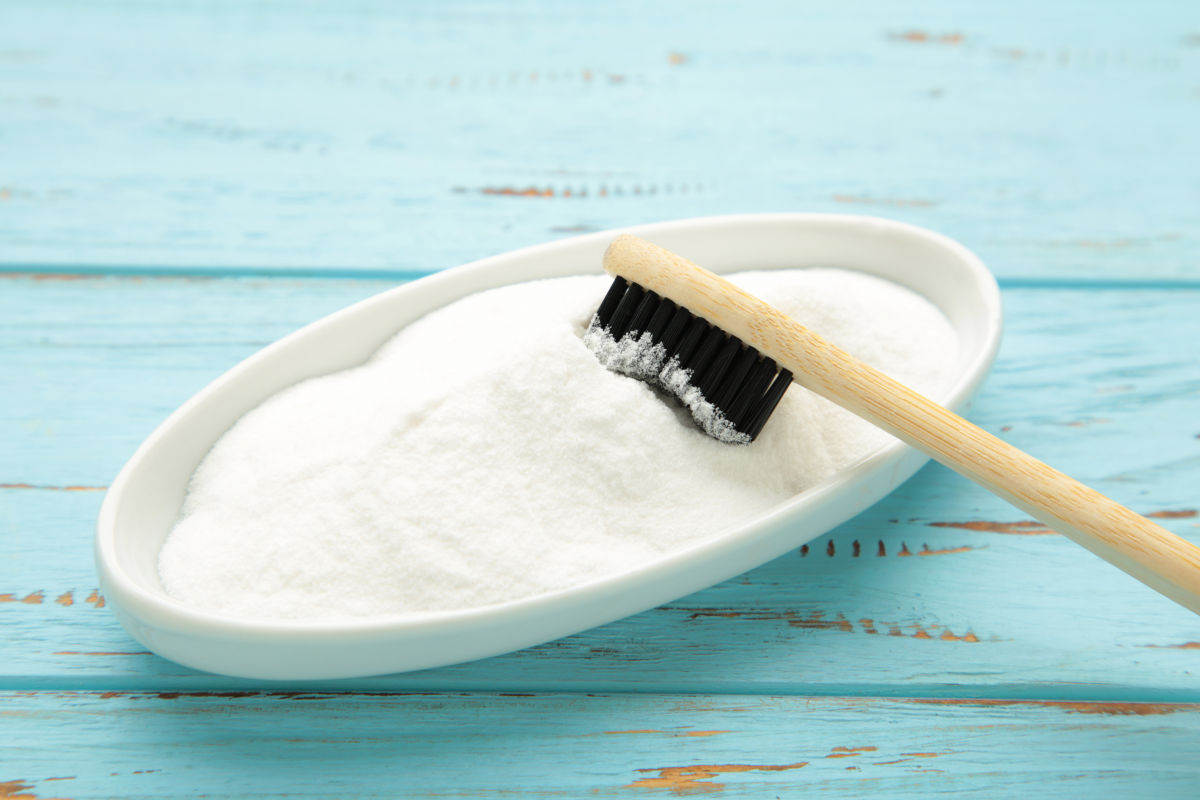Contents

Baking Soda for White Teeth: How-To, Risks, and Alternatives
Do you dream of a dazzling smile but are self-conscious about your yellowing teeth? Don't worry, there are natural and inexpensive solutions to regain white teeth. Among them, baking soda, a product with multiple uses, especially in oral hygiene.
But how does it work? Is it safe for your teeth? What are the other options? We'll tell you everything in this article.
What Exactly Is Baking Soda?
Also known as sodium bicarbonate, baking soda is a natural white powder, odorless and soluble in water. Be careful not to confuse it with caustic soda, a dangerous product, or sodium carbonate used in industry.
Baking soda is found naturally in seawater and in all living things. But the one sold in stores is generally made from salt and limestone through a chemical process. There are three types of baking soda depending on their purity level: food grade, medicinal, and technical. For dental use, always choose food-grade baking soda.
How Does Baking Soda Work on Teeth?
The whitening power of baking soda is explained by two complementary mechanisms:
- Its chemical composition helps dissolve food residues, remove tartar, and balance the oral pH for better hygiene.
- Its grains have a slightly abrasive action on the enamel, much like a gentle scrub that polishes the tooth surface.
Used regularly, baking soda cleanses the mouth, reduces yellowish stains, and helps with bad breath. But be careful not to overdo it! Too frequent or too vigorous use could damage the enamel.
How to Use Baking Soda to Whiten Teeth
There are several ways to use baking soda to clean your teeth:
- In addition to your usual toothpaste: simply sprinkle a little powder on your brush already loaded with toothpaste, then brush normally.
- Alone, after your regular brushing: dip your wet brush in the baking soda and gently rub it on all surfaces of the teeth, without pressing hard. Rinse well.
- By making your own homemade toothpaste: mix 3 tablespoons of white clay powder, 1 tablespoon of baking soda, and a few drops of peppermint essential oil. Store in a small glass jar, ideally in a cool place.
In all cases, limit this whitening brushing with baking soda to once or twice a week at most and always rinse your mouth thoroughly with plain water afterward. And in case of gum sensitivity or weakened enamel, ask your dentist for approval first.
What Are the Risks of Whitening Your Teeth with Baking Soda?
While most fans of baking soda praise its benefits for teeth, health professionals urge caution. Indeed, despite its interesting properties, baking soda is not without risks:
- Its abrasive effect can weaken the enamel if used too often or rubbed too vigorously.
- At high doses, it can also cause mucosal ulcerations.
- In sensitive individuals, it increases the risk of developing cavities.
That's why you should not exceed occasional use, once or twice a week at most. And baking soda is strictly not recommended for pregnant women, children under 6, and people with dental problems (fragile gums, damaged enamel...).
That said, baking soda is much less aggressive than other whitening products like the hydrogen peroxide used in professional treatments. It's all a matter of frequency and common sense!
Where to Find Baking Soda and at What Price?
Easy to find and inexpensive, you can find food-grade baking soda:
- In supermarkets
- In pharmacies and drugstores
- In health food stores
- Online
Always choose a well-labeled and packaged product. Major brands are a guarantee of quality. In terms of budget, expect to pay between $2 and $5 for a one-pound box on average.
Once you have your baking soda, store it away from light and moisture, in a cupboard and out of reach of children.
What Other Natural Options for White Teeth?
To gently regain a radiant smile, you can also rely on:
- Activated charcoal: like baking soda, this ultra-porous black powder traps stains and pollutants. It is used in the same way, but be careful, it can temporarily stain your teeth!
- Coconut oil: as a mouthwash (oil pulling technique), it cleanses the mouth and helps to remove plaque thanks to its antibacterial properties.
- At-home whitening kits: more effective than baking soda alone, they allow for the safe application of a professional whitening gel.
Baking Soda: More Than Just a Teeth Whitener!
Baking soda is a true multi-purpose tool known for its thousand and one uses. Beyond the smile, it is also used:
- In medicine: for heartburn, acid reflux, skin problems...
- In cooking: as a leavening agent, preservative, acidity regulator...
- In the home: for stain removal, cleaning, deodorizing, water softening...
Teeth Whitening with Baking Soda: The Final Word
If used sparingly and with caution, baking soda is a natural and economical solution to regain whiter teeth. Its gentle action is suitable for those who want to brighten their smile gently, provided they don't overdo it!
If you are looking for superior effectiveness, turn instead to at-home whitening kits or professional whitening at the dentist's office. More expensive but much safer and more effective!
And don't forget that the best formula for long-lasting white teeth is good oral hygiene: careful brushing after every meal, flossing, annual cleanings... And a little bit of baking soda from time to time to perfect it all!
